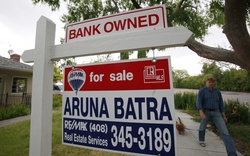Foreclosures rise in 75 percent of metropolitan areas

A man walks in front of a foreclosed home in Palo Alto, Calif. Bloomberg.com is reporting that foreclosures are rising in three-fourths of the metropolitan areas in the U.S.
(AP Photo/Paul Sakuma)
An article on Bloomberg.com is making it clear that the U.S. is still deep in the housing crisis. According to the article, foreclosures rose in 75 percent of metropolitan areas.
"The number of properties receiving a filing more than doubled from a year earlier in Baltimore, Oklahoma City and Albuquerque, New Mexico, the mortgage-data company said today in a report. Notices of default, auction or bank seizure rose more than 50 percent in areas including Salt Lake City; Savannah, Georgia; and Atlantic City, New Jersey," the article states.
Rick Sharga, senior vice president for marketing at Irvine, California-based RealtyTrac blamed the continuing foreclosure crisis on high unemployment. The article said far fewer jobs were created in June than economists had projected.
Las Vegas had the highest foreclosure rate with 6.6 percent of households receiving a foreclosure notice.
Read the full article here.


Comments
KJMClark
Fri, Jul 30, 2010 : 11:34 a.m.
Can we end the infatuation with "ownership" now? As more and more people are forced back into renting, we should take a good look at whether our society's incentives for "owning" are really a good idea. We should phase out the whole mortgage interest deduction and replace it with a per-person housing tax credit. Everyone needs to live somewhere, but the interest deduction just encourages housing bubbles, just as the credit-card interest deduction probably contributed to the inflation of the 70s. Further, we should realize that the conservatives are right about Fannie Mae and Freddy Mac. They were valuable after WW2, but it's time to shut them down. We can replace them with targeted tax deductions. They were not the cause of this bubble (deregulation and Chinese mercantilism were bigger problems), but they certainly contributed. We have enough to deal with without massive housing bubble agencies that become lodestones around our necks when their bubbles burst.